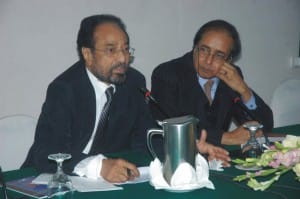Strengthen criminal justice system to protect victims

Supreme Court Bar Association President Barrister Amir-Ul Islam addresses a publication ceremony of a special journal on criminal justice issues at Sonargaon Hotel in the city yesterday. On his left is BILIA Director Ambassador Wali-ur Rahman.Photo: STAR
Legal experts yesterday stressed the need to strengthen the criminal justice system in order to ensure fair investigation and protection of the victims and witnesses.
The country is yet to find a satisfactory solution to the issue of compensation for the victims, former chief adviser of a caretaker government Justice Muhammad Habibur Rahman said while launching a special journal on criminal justice issues at Sonargaon Hotel in the city.
Bangladesh Institute of Law and International Affairs (BILIA) published the journal in collaboration with Department of Justice of Canada's CIDA Legal Reform Project. President of Supreme Court Bar Association Barrister Amir-Ul Islam chaired the publication ceremony.
Justice Habibur Rahman said that improving the methods of administration of criminal justice is the only way to ensure peace and order through forestalling attempts of vengeance and violence.
"Unless the crime is punished, vengeance will continue," he said.
Describing the GDP growth of 7 percent as the country's biggest success and the price hike of essentials as an acute crisis, Justice Rahman said, "Our country cannot be termed a failed state because of such economic progress. But our failure to prosecute, particularly to curb crimes, is evident."
"We can understand how helpless the government is when they ask people to file cases, saying that the government would assist them in investigation. People feel sad when the government expresses its feelings of helplessness," he added.
Barrister Amir-Ul Islam said that punishing the perpetrators of crimes is not the only purpose of the criminal justice system. "It should also facilitate the process of civil compensation for the victims."
He noted that criminal justice system does not address the emotional, physical, mental and financial challenges.
The police should play the role of people's guardian and the investigation should be separated from law and order control activities, he said, adding that the objective of interrogation should be to find out clues, not to extract confession from the accused.
He also said, "We're showing 360 degree tolerance when the question of trial of war criminals comes up, whereas we should show zero tolerance."
BILIA Director Ambassador Wali-ur Rahman, CIDA Counsellor Rajani Alexander, CIDA Legal Reform Project Director Paula Kingston and Field Project Director Alnoor S Meghani also spoke.

 For all latest news, follow The Daily Star's Google News channel.
For all latest news, follow The Daily Star's Google News channel. 



Comments